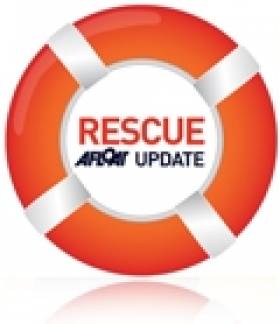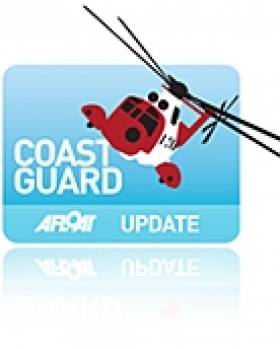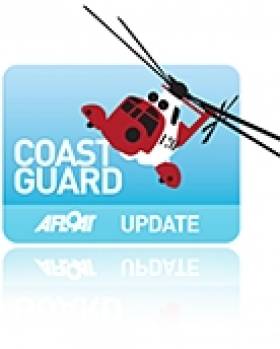Displaying items by tag: Slieve League
Elderly Woman Survives Fall From Europe's Highest Sea Cliff
#Rescue - An elderly woman was rescued on Thursday 11 July after slipping off the highest sea cliff in Europe.
The Belfast Telegraph reports that 71-year-old Vera Flynn became separated from her sister while walking the cliff path at Slieve League in Co Donegal.
According to the Donegal Democrat, it's believed she took a wrong turn on the path and slipped down the cliff face, becoming trapped in a ravine 400 metres from the top.
After a search lasting many hours, the woman was located by the Killybegs Coast Guard cliff rescue team and winched to safety, reportedly uninjured in her ordeal.
“There’s no doubt that this lady’s exceptional fitness helped her in this situation, given that she was out such a long time and it was such a hot day," said Killybegs coastguard press officer Shane McCrudden.
Dramatic Donegal Rescue Marks Busy Start to 2012 for Coastguard
#Coastguard - The Irish Coast Guard has had a busy first few days of the New Year with a number of incidents around the country, including a dramatic search and rescue incident in Donegal.
Carlow man Cormac Nolan was rescued after falling 200 feet and becoming trapped in a crevasse while walking on the Slieve League cliffs on the north west coast of Donegal on Tuesday 1 January.
The cliffs are among the highest sea cliffs in Europe, and combined with the man's precarious position and the weather conditions at the time, the Sligo-based Irish Coast Guard helicopter was unable to winch the man to safety despite its swift response.
The operation - assisted by the Killybegs coastguard unit, Donegal Mountain Rescue and the Aranmore RNLI lifeboat – proceeded to a cliff descent which itself was hampered due to shingle on the cliffside.
Search teams eventually reached the casualty after 10:30pm and began the slow process of bringing him back up the cliff, finally doing so around midnight.
The 28-year-old - who discussed his ordeal on RTÉ Radio's News at One this afternoon - was transported by coastguard helicopter to Sligo General Hospital but no serious injuries were reported.
The Donegal incident was just one of a number of search and rescue taskings received by the Irish Coast Guard over the New Year period, coming after news that the coastguard saved 161 lives last year.
Other incidents included searches for missing persons in Wicklow and Dublin and dispatches to reports of persons in the water in Waterford, Limerick and Louth.
Speaking yesterday, Irish Coast Guard director Chris Reynolds said: “Last year was the busiest ever for the Irish Coast Guard and already in the early days of 2013 we have provided assistance in a number of incidents.
"I am appealing again to the public that they heed local advice and be aware of weather conditions if walking or hiking along our coastline, particularly during winter time.”
Reynolds continued: “There is safety in numbers, so never be alone while walking along cliff paths if possible. Let somebody know when and where you are going and what time you will be back. Stay well away from the cliff edge, both top and bottom. Don’t attempt to rescue people or pets if they fall over the edge.
"If assistance is required dial 112 and ask for the coastguard. Advice as always from the coastguard is if you do see someone in difficulty in the sea, on the shore, cliffs, lakes or rivers, dial 999 or 112 and ask for the coastguard.”
Tourist Saved By Light of Mobile Phone
A tourist was rescued from some of Ireland's tallest sea cliffs in Co Donegal yesterday when a coastguard team spotted the light from her mobile phone.
The Irish Independent reports that the 24-year-old German woman had gone missing in an area known as the Pilgrim's Path, near Slieve League, on Saturday evening.
A full-scale search was mounted by the Donegal Mountain Rescue Service after she failed to return to Bunglass as scheduled.
The woman was eventually located by the Killybegs unit of the Irish Coast Guard in the early hours of yesterday morning. She was unharmed apart from a slight ankle injury, and was said to be "very wet, cold and disorientated".
Brian Murray of Donegal Mountain Rescue said: "There was no mobile phone signal in the area and she was lucky that the coastguard service managed to see the light from her phone."
The woman is the second tourist to go missing in the same part of Donegal in recent weeks.


























































